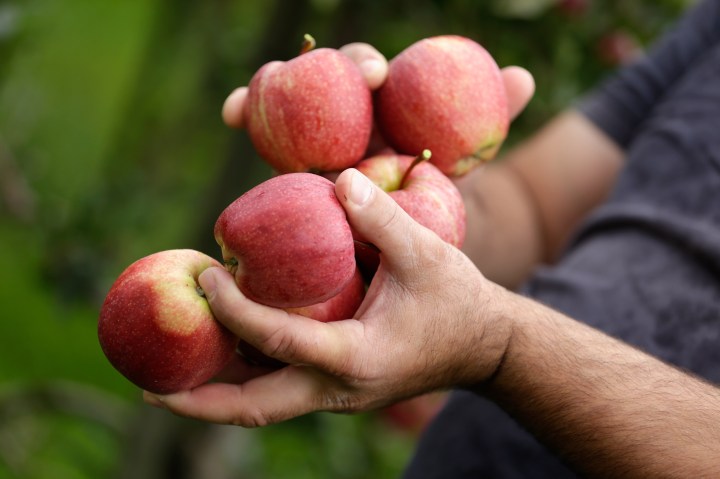
Washington apple farmer is “optimistic” as workers get vaccinated
Washington apple farmer is “optimistic” as workers get vaccinated

As the vaccine rollout ramps up in the United States, more people, including health care workers, essential workers and seniors are becoming eligible to receive the shots. Most recently, the state of Washington expanded eligibility to agricultural workers.
Getting farm workers vaccinated is critical, said Patrick Smith, who with his family runs Loftus Ranches, an apple and hops farm in Yakima, Washington. Smith said farm workers often live and work in close quarters.
“They are on the front lines of the food production industry in this country, and putting them at a high priority to get vaccinations, like the state of Washington has done here, is welcomed,” Smith said.
Smith said he’s hopeful the vaccinations will allow his business to return to normal. Loftus Ranches also runs a brewery, called Bale Breaker Brewing Co., and Smith said some sales didn’t go through because fewer people are going out to bars and restaurants. He recently spoke to “Marketplace” host Kai Ryssdal about what he’s expecting for business in the coming months.
The following is an edited transcript of their conversation.
Patrick Smith: You know, we’re feeling pretty optimistic here, especially today. The state of Washington accelerated the timeline for vaccinations for agricultural workers. And so we’ve actually got most of our employees today at a clinic getting their first shot. So it feels really good to be in this spot right now.
Kai Ryssdal: Yeah. Just a quick word here on your workforce, right? I mean, you deal with a mobile workforce, right? They come in, they go, they move around. You obviously pay the expenses. I talked to you and your dad when I was up there a number of years ago, you put them up. But they’re in, you know, sort of group housing, and it’s close quarters, and vaccine and virus stuff is real for them on the ground.
Smith: Yeah, it’s close quarters. They work together, they ride to work together, they cook dinner together. Yeah, those environments definitely do have a higher risk of transmission and, you know, accentuates the importance of getting those people vaccinated. They are on the front lines of the food production industry in this country, and putting them at a high priority to get vaccinations, like the state of Washington has done here, is welcomed, especially in areas like Yakima County, where such a high percentage of the population is involved in these types of activities that don’t lend themselves to working from home.
Ryssdal: Yeah. I don’t want to get too deep into the politics of this, but obviously, there’s a change in the White House. There is some change in trade policy certainly being talked about. Is that a wash for you? Have you seen it? Are you paying attention to it?
Smith: Yeah, yeah, we’re paying very close attention to it. You know, there’s still some challenges to overcome around, you know, some of these shipping container shortages and just global supply chain and logistics issues that are impacting our ability to get some of our products overseas.
Ryssdal: All right, wait, let me back up to the shipping container thing, because we had a story on the program a number of days ago about shipping containers and the shortage of it, and I need you to help me understand how an apple farmer in the Yakima Valley is concerned about a global shortage of shipping containers. I guess your stuff goes in containers.
Smith: Yeah, yeah. So for the products that we ship over to Asia, going on ocean freight and shipping containers is our primary method of getting that freight over to large Asian markets, right, and so when we don’t have the big metal boxes to put them in to get them on the boat, that fruit sits here in Washington waiting.
Ryssdal: It’s a global economy, we just work in it. Real quickly, can’t talk to you without talking about hops, because you guys make beer too. I am, in point of fact, wearing my Bale Breaker Brewery T-shirt today, which I paid for, by the way, just for the record. How’s the hops business? That’s what’s going in the ground, right, hops now?
Smith: Yeah, yeah, we’re getting fields prepped for planting for hops. The hops businesses is good. But you know, sales that we thought we were going to have didn’t come to fruition because people aren’t drinking out in bars and restaurants. And so there is certainly an impact there, but we’re getting through it.
Ryssdal: So just real quick, and then I’ll let you get back to the work of actually running your farm. How long do you figure it’s going to be until you can look back and say, “OK, we’re through it, and things are normal again.” What’s your guess?
Smith: Yeah, I’m really hopeful that when we get to our harvest season, globally, things are really looking up. I’m pretty optimistic. Hopefully by kind of late summer, we’ve got most of the pain behind us.
There’s a lot happening in the world. Through it all, Marketplace is here for you.
You rely on Marketplace to break down the world’s events and tell you how it affects you in a fact-based, approachable way. We rely on your financial support to keep making that possible.
Your donation today powers the independent journalism that you rely on. For just $5/month, you can help sustain Marketplace so we can keep reporting on the things that matter to you.


















